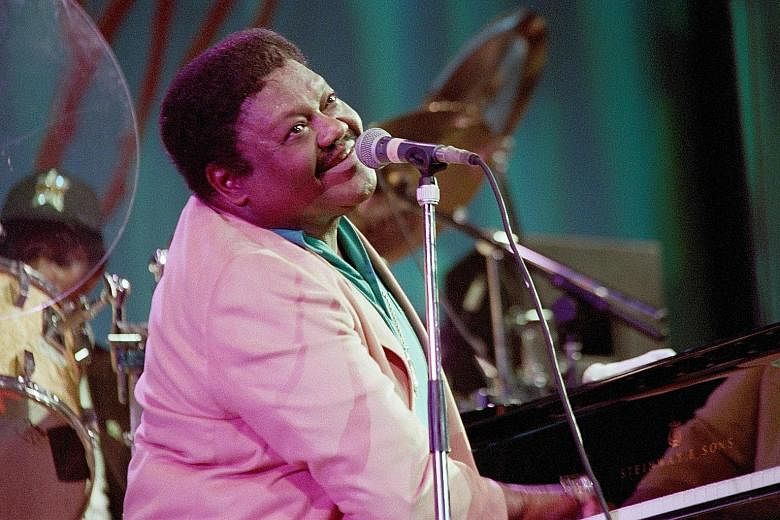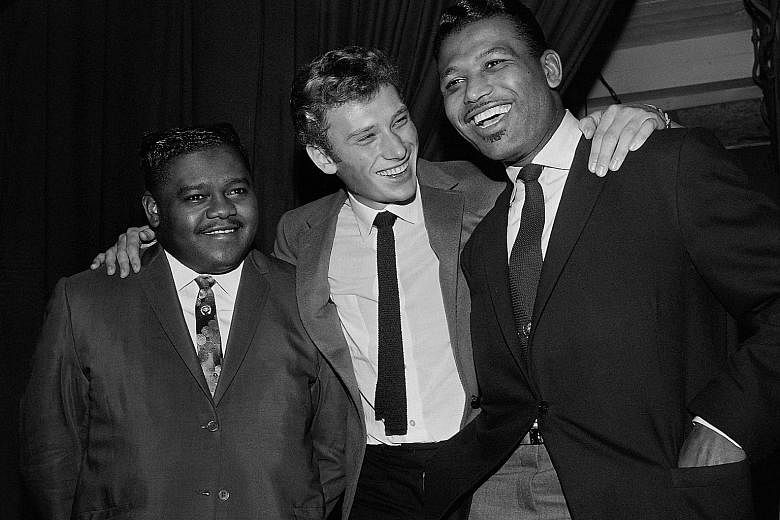WASHINGTON • Fats Domino, the jovial New Orleans entertainer whose bluesy singing and boogie-woogie piano style helped launch rock 'n' roll in the 1950s with rollicking songs such as Blueberry Hill, Ain't That A Shame and I'm Walkin', died on Tuesday. He was 89.
His death was confirmed by the Jefferson Parish coroner's office.
He had more than three dozen Top 40 pop hits through the 1950s and early 1960s, among them Blue Monday and Walkin' To New Orleans. Throughout, he displayed both the buoyant spirit of New Orleans, his home town, and a droll resilience that reached listeners worldwide.
He sold 65 million singles in those years, with 23 gold records, making him second only to Elvis Presley as a commercial force.
At a news conference in Las Vegas in 1969, Presley interrupted a reporter who had called him "the king". He pointed to Domino, who was in the room, and said: "There's the real king of rock 'n' roll."
Rotund and standing at 1.65m - he would joke that he was as wide as he was tall - Domino had a big grin, a fondness for jewel-encrusted rings and an easygoing manner in performance; even in plaintive songs, his voice had a smile in it. He was a master of the wordless vocal, making hits out of songs full of woo-woos and la-las.
Moreover, his signature piano triplets - three notes for every beat - became the basis of rock and pop ballads for the next three decades, including diverse recordings such as The Beatles' Oh, Darling, Otis Redding's These Arms Of Mine and even Percy Faith's Theme From A Summer Place.
-
Domino hits
Here are 10 songs from Fats Domino's prime years
The Fat Man (1949): Domino announced himself to the world with this single - a two-fisted boogie-woogie piano introduction with tremolo flourishes, verses that establish his 90.7kg physique and his New Orleans locale, a falsetto vocal like a trumpet solo and more splashy piano.
Blueberry Hill (1956): Now indelibly associated with Domino, Blueberry Hill had been around since 1940, recorded by Gene Autry, Glenn Miller and Louis Armstrong, among others. But it took Domino's utterly satiated vocal, atop a New Orleans backbeat and his trademark piano triplets, to make the "thrill" so thoroughly lusty.
I'm Walkin' (1957): Hand claps and a breezy, bluesy guitar riff conceal yet another tale of romantic woe coupled with resentment. Sure, he wants her back, but once he has her, he might just "say bye-bye" himself.
Ain't That A Shame (1955): Heartbreak has rarely sounded as survivable as it does on Ain't That A Shame, from the terse stop-time beginnings of its verses - "You made/Me cry/ When you said/Goodbye" - to its joshing saxophone solo. Domino sings about tears, but he is vehement when he insists, "You're the one to blame".
Blue Monday (1955): Saturday's good times make up for the rest of the week's hard work and hangover in this song, as Domino's piano triplets become a pile driver.
Walkin' To New Orleans (1960): A string section eased Domino into formal 1960s pop for Walkin' To New Orleans, but it is easy to hear the twinkle in his eye.
I'm Gonna Be A Wheel Someday (1958): Domino's piano sits out for this almost-rockabilly song; instead, his voice glides above a brisk rhythm guitar, gloating over the prospect of career success as romantic revenge.
She's My Baby (1949): Flamboyant boogie-woogie piano romps through She's My Baby, spurring a rambunctious vocal that breaks into falsetto as Little Richard would a few years later.
Swanee River Hop (1953): This frantic instrumental showpiece is one of Domino's favourites.
All By Myself (1955): This light-hearted come-on is a two-minute slice of loose, piano-pounding rock 'n' roll with the tempo fluctuations of a real-time performance.
NYTIMES
Antoine Domino Jr was born on Feb 26, 1928, in New Orleans' 9th Ward, the youngest of eight in a bilingual Creole family.
Music filled his life from the age of 10, when his family inherited an old piano.
After his brother-in-law Harrison Verrett, a traditional-jazz musician, taught him a few chords, Domino threw himself at the instrument so enthusiastically that his parents moved it to the garage.
He was almost entirely self-taught, picking up ideas from boogie-woogie masters such as Meade Lux Lewis and Pinetop Smith.
He attended the Louis B. Macarty School, but dropped out in the fourth grade to work as an iceman's helper.
"In the houses where people had a piano in their rooms, I'd stop and play," he told USA Today. "That's how I practised."
In his teens, he started working at a club called the Hideaway with a band led by bassist Billy Diamond, who nicknamed him Fats.
Domino soon became the band's frontman and a local draw - enough of a draw to concern Dave Bartholomew, a trumpeter whose band worked down the street.
In 1949, Bartholomew, moonlighting as a talent scout for Imperial, a struggling California record label, brought the label's owner, Lew Chudd, to the Hideaway.
Chudd, who was white, later recalled that he had to scrunch down in the back seat of Bartholomew's car because of New Orleans' segregation laws. Domino signed with the label on the spot.
Immediately, Domino and Bartholomew wrote The Fat Man and recorded it with Bartholomew's studio band. By 1951, it had sold a million copies.
Domino's trademark triplets, picked up from It's Midnight, a 1949 record by boogie-woogie pianist and singer Little Willie Littlefield, appeared on his next rhythm-and-blues hit, Every Night About This Time.
The technique spread like wildfire, becoming a virtual requirement for rock 'n' roll ballads.
Domino's appeal to white teenagers broadened as he embarked on national tours and appeared with mixed-race rock 'n' roll revues. Appearances on national television, on Steve Allen's and Ed Sullivan's shows, put him in millions of living rooms.
Domino's 1955 hit Ain't That A Shame, his first recording to enter the pop charts, was narrowly eclipsed in sales by pop singer Pat Boone's cover version.
Producers had to dissuade Boone from changing the song's refrain to the grammatically correct "isn't that a shame".
Domino had his biggest hit in 1956 with his version of Blueberry Hill, a song that had been recorded by Glenn Miller's big band in 1940. It peaked at No. 2 on the pop charts and sold a reported three million copies.
As his record sales declined in the 1960s, Domino performed steadily in Las Vegas, but lost money in the city's casinos.
At his first Las Vegas engagement in 1962, he gambled away US$180,000 in two weeks. His fee for the engagement was US$6,500 a week.
"I went to play the Flamingo for two weeks and I stayed for 15 years," he told USA Today.
Domino's life on the road ended in the early 1980s, when he decided that he did not want to leave New Orleans, saying it was the only place where he liked the food.
He remained in the impoverished neighbourhood where he grew up. He often invited people from off the street into his home, a mansion among the neighbourhood's "shotgun shacks", to taste his Creole cooking.
His wife, the former Rosemary Hall, whom he married in 1947 and for whom he named the song Rose Mary, died in 2008.
They had eight children, Antoine III, Anatole, Andre, Antonio, Antoinette, Andrea, Anola and Adonica. Andre died in 1997. A complete list of survivors was not immediately available.
Although Domino did travel to New York when he was inducted into the Rock and Roll Hall of Fame in 1986 as one of its first members, he stayed home when he received a lifetime achievement Grammy Award in 1987.
In 1999, when he was awarded the National Medal of Arts, he sent his daughter Antoinette to the White House to pick up the prize on his behalf.
He even refused to leave New Orleans when Hurricane Katrina devastated the city on Aug 29, 2005, remaining at his flooded home until he was rescued by helicopter on Sept 1.
"I wasn't too nervous" about waiting to be saved, he told The New York Times in 2006.
"I had my little wine and a couple of beers with me; I'm all right."
WASHINGTON POST, NYTIMES


